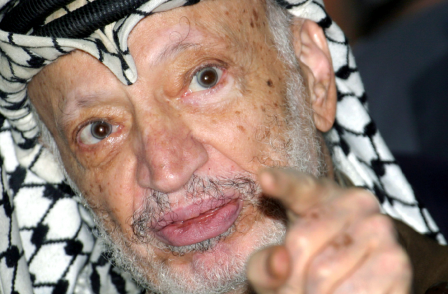
The Al Jazeera reporter whose documentary claimed that Palestinian President Yasser Arafat was likely to have been poisoned by radioactive polonium has accused the Palestinian Authority of suppressing or obstructing the investigation into his demise for years and of trying to intimidate him and his fellow researchers.
"At first they said well done, then when filming in Ramallah I found myself under pressure as if I were in North Korea," Clayton Swisher told Press Gazette from Doha, the headquarters of the Qatar-owned satellite channel for which he has worked since 2006.
He said he had been followed by Palestinian security agents in the Palestinian city of Ramallah, and had his hotel room bugged – though he turned the tables on his pursuers by installing a secret camera in his room to catch an agent in the act, a scene he showed in his documentary film "Killing Arafat". Though he had initiated the entire enquiry, his Al Jazeera crew were denied entry denied access to film even generic shots around Arafat’s mausoleum – he said.
"They've been trying to avoid the issues like an alcoholic uncle at a Thanksgiving party," said Swisher, who before becoming a journalist was a special agent and criminal investigator for the US State Department, providing bodyguard security to foreign dignitaries visiting the US, including Arafat. "All these years they have been trying to shy away from this question."
The PA had had not called for any post mortem, and its own investigative committee had only written one letter, nearly five years after Arafat's death, to the French authorities asking for details of their leader's death, Swisher said.
There had been widespread initial publicity when late last year Al Jazeera's first documentary appeared and reported high polonium levels were found on Arafat's hats and underwear – stored for years in a lawyer's office. Despite these revelations, said Swisher, The Palestinian Authority had tried for months to delay any exhumation.
He attributes some of the antagonism or suspicion by the Palestinian Authority (PA) to a fear that it would or could expose the actual perpetrators of Arafat's demise – which, said Swisher, meant that at least "one of them may have conspired" to poison their leader. Soon after eating a meal in his headquarters in Ramallah in October 2004, Arafat was taken ill, eventually flown to a Paris military hospital, and died, aged 75.
French doctors said at the time there was no evidence he was poisoned, though they could not establish the original cause of his illness.
Following the first Al Jazeera documentary “What killed Arafat” in 2012, the court of Nanterre opened a murder investigation, seeking formal access to Arafat’s burial site in Ramallah.
Their report on last year’s exhumation is still pending – but the conclusions of at least two other teams involved in the forensic studies of Arafat’s corpse (one Swiss and one Russian) have since been leaked to the media.
A Russian report was "inconclusive", according to the Palestinian investigating committee.
Swisher said the PA had tried to prevent the Swiss laboratory doing the tests from continuing to co-operate with the Al Jazeera, and had demanded that the laboratory's final report not be published until the PA chose to release its findings. Swisher said that Al Jazeera, together with Suha Arafat, believing the embargo demanded was "unenforceable", had defied the PA's wishes, and had placed the 108-page document on its website the day after they got hold of it.
Al Jazeera has trumpeted the Swiss report, which it initiated, as backing claims that Arafat was murdered. Its documentary suggested the Russian investigation had deliberately downplayed the polonium poisoning theory for political reasons. The claim of Russian government interference in the investigation was based on a tip-off from an unnamed person who said he had inside knowledge. A scene in the documentary shows Swisher meeting this source with the Russian's face fuzzed out and his voice deliberately distorted.
Swisher also said he was perplexed at statements made by the Palestinian Authority's official medical expert at a press conference earlier this month. Dr Abdullah Bashir had said both the Swiss laboratory and the Russians had found "high levels" of polonium in Arafat's body. Yet Swisher said a leaked 15-page copy of what Al Jazeera was told were the conclusions of the Russian investigation showed abnormally low levels of polonium. "Someone is pulling the wool over someone's eyes." Swisher said.
The Palestinian investigating committee's chairman, former PA Intelligence chief Tawfiq Tirawi, told the Voice of Russia last weekend that the Swiss and Russian reports had one thing in common: neither found any medical explanation for Arafat's death – from which he concluded it had to be poisoning, which he said must have been initiated by Israel. "To me it doesn’t matter so much what kind of poison was used," Tirawi said. "It has been proven that Arafat was killed." When asked if anyone had yet been arrested for the supposed crime he said he "cannot answer", but it might take a year to find the actual perpetrator.
Major-General Tirawi was one of the top Palestinian officials seen at Arafat's side in his final few months. "That he was in close proximity when Arafat fell ill makes him at best a witness. For him to lead the investigation now is almost as farcical as the PA’s entire approach to date," Swisher wrote in a newspaper comment piece.
Email pged@pressgazette.co.uk to point out mistakes, provide story tips or send in a letter for publication on our "Letters Page" blog
